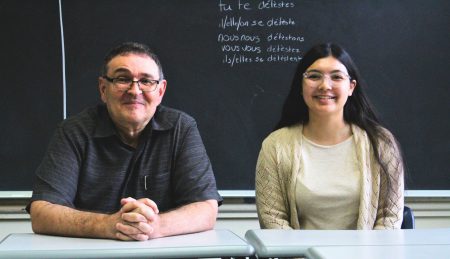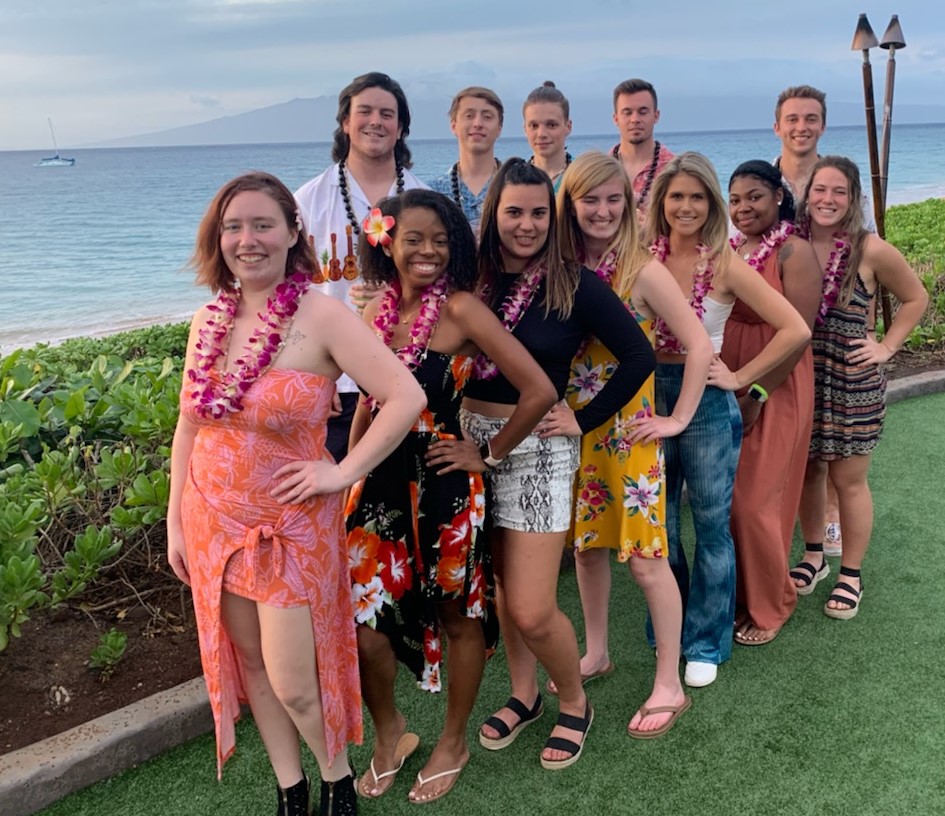Dr. Gabon and Abby Villacrusis in the classroom
McKenna Howenstine|Marlin Chronicle
There are 28 students enrolled in BIO 200, Diversity of Life, a major course for Biology. 25 are enrolled in MBE 301, Principles of Management, a junior-level business course. There are 38 in EES 200, Oceanography, commonly taken as a lab credit.
PHIL 309, Critical Thinking in a Digital Age, a Philosophy course, has four. FR 307, Topics in Advanced Conversation and Composition, an upper level French class, has one.
Virginia Wesleyan offers a lot of majors – 42, according to the VWU website – some of those are very crowded. Business and Biology as the largest, according to a Marlin Chronicle review of publicly available information and information given by several professors. Some majors are less populated.
“I’m pretty sure I’m the only French major,” Abby Villacrusis, a senior and double major in French and Media and Communication, said. Dr. Alain Gabon, associate professor of French, confirmed, although both said that another student was going to declare upon return from her study abroad in France.
The experience of being the only declared major is rare, even at a school as small as Virginia Wesleyan. According to Villacrusis, it has its upsides.
“If I need a class, I can just directly email Dr. Gabon,” Villacrusis said. She described a conflict in her class schedule with a required class for Media and Communication, where Gabon was willing to adjust the class time slot to allow her to take both.

McKenna Howenstine|Marlin Chronicle
She said that would not have happened in Media and Communication. Most professors in larger majors would find it much more difficult to accommodate such a request due to a larger group of students looking to take courses and a less flexible schedule.
Majors are small for a variety of reasons, and the reasons tend to vary from major to major.
“Philosophy is typically not the first thing people think about when thinking about a major,” Dr. Steven Emmanuel, professor of Philosophy and chair of the Philosophy department, said. He said that a major reason for that is that people don’t think of Philosophy majors as doing well after college financially or professionally. According to Emmanuel, that is incorrect.
“Philosophy majors do exceedingly well—this is like the best-kept secret in the world,” Emmanuel said. He said that Philosophy “equips students with a skill set” that leads students to be able to succeed in a world that calls for a variety of aptitudes.
“That’s the real value of philosophy,” Emmanuel said. “It’s not as much about the answers as the pursuit of the truth.”
Another reason for the low enrollment, he said, was the removal of the “values requirement,” which used to be a breadth requirement and brought a lot of students through Philosophy. Back then, he said, they were more likely to have 18 majors than eight.

Sarah Richards|Marlin Chronicle
Villacrusis said that French was lower because it’s hard to get into if one didn’t take French in high school. Gabon said that the school didn’t require enough foreign language, and estimated that only 20% of students take even one class studying a culture other than our own.
Emmanuel said that the more popular majors were requiring more credit hours, making it more difficult for students to double major. Gabon said that students were wary of taking majors that had the perception (although not reality) of being more able to lead to a stable job.
Whatever the reason, many classrooms on campus in a lot of departments have few students in seats. Both Gabon and Emmanuel expressed concern over a new proposal that classes have 15 students, as opposed to the current policy, which is eight.
“It’s completely unrealistic,” Gabon said of the 15 person limit, adding that it would “simply eliminate a whole bunch of programs.” He said that the school was currently “very liberal” and understood that some classes needed to operate with fewer students than 15, or even eight, but was worried that if implemented, it would harm the school. He said that majors, once they are gone, are a lot harder to get back.
“There’s never been anything close to 15 students, ever,” Gabon said of French, discussing a heyday of French when a group of five dedicated students managed to bring in a lot of traffic to the major. He emphasized that the school has been very understanding of his and other programs needing to operate on smaller numbers. One policy is counting multiple classes towards the limit, or having more than eight students in one class allowing him to run fewer in another.
“I think this administration could do a lot more,” Emmanuel said. He said that “critical reasoning” should be a requirement for all students in the same way a lab credit and English 105 are. He added that he was “very confident” about the value that Philosophy brings.
“We don’t have lots of majors, but we’ll have majors,” Emmanuel said.
Dr. Susan Larkin, provost and vice president for Academic Affairs, canceled an initial interview and declined to schedule a later talk with the Marlin Chronicle on this topic via Marina Maye, administrative assistant to the provost.
However, it’s hardly doom and gloom in these classrooms, even if they don’t have 15 students in chairs—maybe especially so. The smaller classes allow for a much deeper understanding of students and professors.
“I know my students very well—especially the majors, however few they are,” Gabon said, adding that he liked to joke that he knew them “better than their own parents.” Gabon has been a professor of French Studies at Virginia Wesleyan since August 1999 and has been the only one for that entire period of time.
“I have to pay attention and know what I’m talking about,” Villacrusis said, since there were no other students to be a buffer between her and the professor. She said she learned a lot about Gabon from talking with him, from his family to his French rocker covers. Both said that language classes naturally lead to this, as one naturally ends up talking a lot about their family and plans in practicing a language.
“I’ve certainly learned more about him than any other professor,” Villacrusis said.
The benefits are hardly negligible, either.
“I had many interests—at the end of the day, I stuck with Philosophy because it stuck with me,” Emmanuel said.
The smaller size at Virginia Wesleyan was one of the reasons Gabon picked VWU over three other options—it allowed him to get to know students better, and to be able to teach a variety of classes. He said multiple times that he was unwilling to get stuck teaching a particularly narrow topic: his example was 19th Century French literature. At VWU, he teaches a variety of classes from French Cinema to Advanced Composition to French Culture.
By Victoria Haneline



